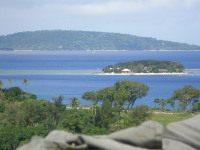
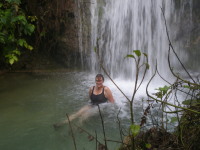
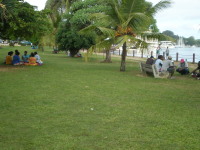
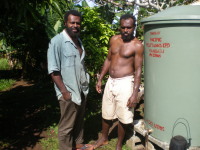
Home
External Vanuatu
Links:
Vanuatu Tourism
Accomodation
Room with a View
Internal links:
Vanuatu - Tanna
email us
You know those safety announcements they give out on commercial flights, the sort that make you feel all safe and secure?
Well, Air Vanuatu wish all 80 passengers a safe and enjoyable flight from Tanna to Efate.

Now look closely at the inside tyre. It is completely bald with the fabric webbing showing through. Makes you feel kind of happy to be taking this flight.
What did we expect? The checking procedure for hand luggage at Tanna airport was most thorough. It consisted ONLY of attaching a sticker marked “security checked” on each item. Job done! Nothing inspected. The security official seemed to miss the girl carrying the 18” bush knife (seen poking from the top of her bag) but then these knives (more of a machete really) are common here and are often wielded by three year olds, frequently with great success when gardening or chopping wood.
We are now in Vanuatu’s capital, Port Vila (population 38,000) on the island of Efate.
Over the years, we have travelled to dozens of countries. However Vanuatu has the honour of being the only one visited without a McDonalds. The Mormons are here, so why not McDonalds?
Vila is a complete contrast to Lenakel, Tanna’s capital. Vila has the usual tourist souvenir shops, harbour side cafes and tours galore. It’s noisy with smoke belching trucks and men shouting (women never shout). Cute palm huts mingle with ugly concrete shops and banks and availability of western goods means it’s pretty dirty with rubbish. There are bins but no one uses them.
The picture shows Vila’s equivalent of Oxford Street, London.
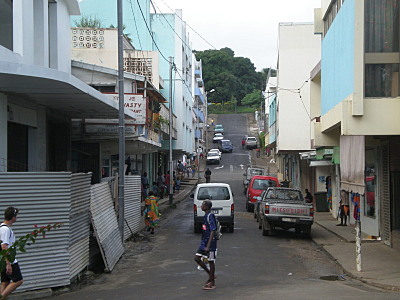
In stark contrast to the real Vila is the tourist island of Iririki, just yards across the bay, with its white, mainly Australian, tourists and Ni-van workers.
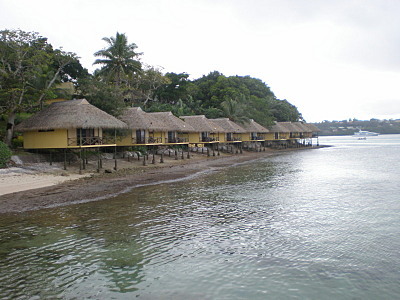
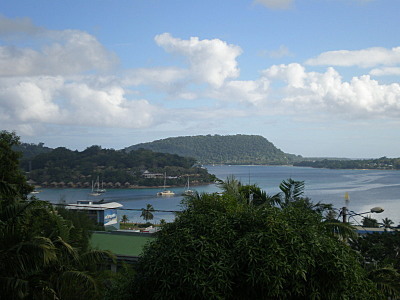
Being the capital, all public buildings are here. They are all mainly modest with the exception of the presidential palace, surrounded by beautiful gardens. When the armed guard on the gate waves and shouts “hello” you know you can only be in Vanuatu.
The Minister for Education is obviously a very important man. His luxurious villa is four times the size of the Department of Education building which looks suspiciously like a scout hut.
The Court House, described by the Lonely Planet Guide as “gloriously pink” was more of an ash grey. It was burnt down yesterday. Now there’s a surprise.
Most of the prime waterfront land is leased by Australians who have opened restaurants. They charge western prices to their exclusively white diners. No Ni-Vanuatu can afford to eat in them. This may be the capital but the locals are still overwhelmingly poor. I asked one market stall holder whether he had stopped work for lunch. His reply was that he couldn’t afford to eat until the evening.
The surprising thing is that the Ni Vanuatu people here do not seem resentful towards the westerners. They are still just as friendly, helpful and welcoming as on Tanna.
Helen sat by the roadside while Roger went to find a pump for a flat bike tyre. Numerous Ni-Vanuatu stopped to ask “yu alraet, yu wantem help, wea yu husband?” It must be a very curious thing indeed to see a white woman alone as Helen has been asked this last question many times.
Roger has a knack for seeing unusual wildlife. It began with a Kiwi in New Zealand, something most locals have never seen in the wild. Since arriving in Vanuatu he has spotted:
A ray, not seen in that particular bay for 30 years
A black and white striped sea snake, quite rare (also highly highly dangerous).
And lastly a Dugong. This mammal is best described as a finless ugly dolphin. This one was about eight foot long. Roger was scuba diving at the time so was lucky enough to be able to play with it within arm’s length, along with two diving instructors. It would circle the divers and mimic them rolling over.
Dugongs are rare, so rare that the sighting caused great jealousy among the diving fraternity on Port Vila, some of whom have been searching for 35 years. Unfortunately Roger did not have an underwater camera, so the following picture is from the internet.
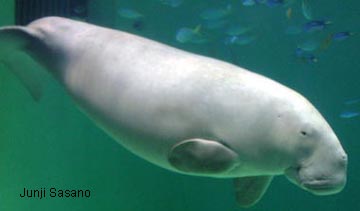
There are two markets in Vila, one at each end of the waterfront. One is strictly geared for tourists with clothing, woven and carved goods and jewelry.
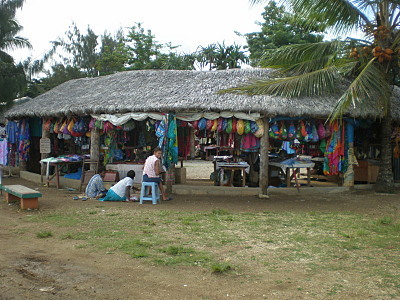
What surprised us most is that at night and over the weekend, the tables are just covered with plastic and left. Many goods are left displayed, uncovered. Theft is becoming an increasing problem in Vila, but only from non Ni-van possessions. Honour among thieves.
At the other end is the fruit and vegetable market. It is open 24 hours a day because transport from the outlying villages is difficult and expensive. People sleep on the floor behind their stalls at night. When we walked past at eight PM, a preacher was delivering a sermon to them – the ultimate captive audience. It shuts down on Saturday afternoon for everyone to return home for church on Sunday.
A reasonable meal can be found in this market cooked on site. It’s always rice with chicken, beef or fish at all of the 20 or so stalls but at £1.50 who’s complaining? Westerners don’t generally eat here – the murky washing up water and grubby cloth used to wipe the cutlery might be a reason but we have survived.
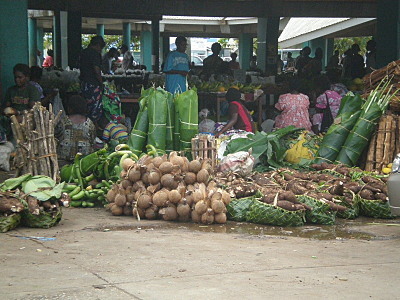
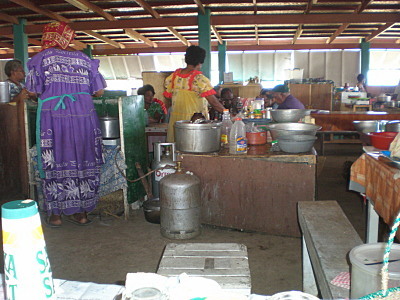
Don’t get sick here. There is a hospital with qualified doctors but it lacks most diagnostic equipment. They do have an ante-natal ultrasound machine working but that’s about it. Other donated equipment is mainly lying broken in some room waiting for a qualified repairer.
Don’t get sick at night especially. There is rarely a doctor on duty and if one can be rustled up he will almost certainly have been on the Kava - as one Dutch lady tourist, in urgent need of a hysterectomy one night found to her cost. She was whisked to New Zealand and fortunately survived.
There are some heroic medical anecdotes such as when Vila hospital ran out of suitable blood during surgery. Luckily they managed to find some - donated by the anaesthetist whilst operating. It’s a rule of thumb that if you have an emergency and if you can afford it, get on the next flight to New Zealand or Australia.
On this medical theme, those of you in the know will be pleased to learn that Roger’s 11 day sitsit wota (bislama word) has now gone having given up the anti-malarial Malarone.
Out of town, Efate island is beautiful. It is all densely forested apart from one perimeter road.
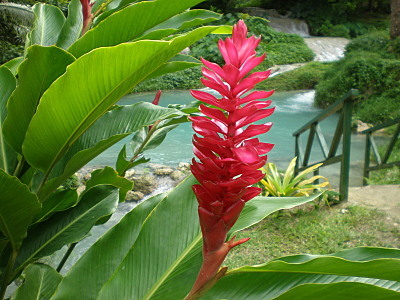
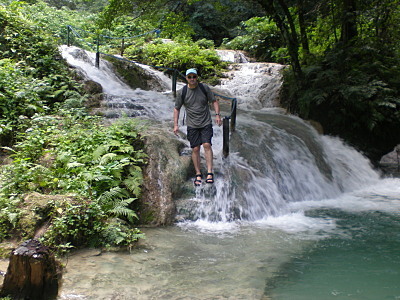
You can climb to the foot of the waterfall at Mele Maat along a roped trail in the white water. UK health and safety laws would never allow it.
We went to a tiny island Nguna for a couple of nights to deliver a thank you gift to a family in Malalieu village, up in the hills.

Picture of Lisau, Chief Taripoamarra’s wife and daughter Emily with Roger looking suave in his (gifted) island shirt and Helen in a fetching tent. We had visited them to say ‘thank you’.
Nguna island is a one hour bumpy, dusty truck ride from Vila, followed by a 40 minute “ferry”, actually a tiny boat. We shared our boat with 18 villagers, two pigs, sacks of rice, toilet rolls and sugar – some of the few necessities they can’t grow.
We had expected Nguna to be as primitive as Tanna and it generally was. We were surprised therefore to find the men of Malalieu actually working. When we arrived the villagers were building a new meeting hall for a forthcoming seminar. The village council were in the process of creating a documented constitution covering land rights, maintaining culture, family values and social responsibility.
The list of practical aims for next year included buying meeting room chairs (none currently), a solar panel (generator too noisy and fuel expensive and only available 3 hours away) and a digital camera. They plan to get income by renting their new meeting room to other villages.
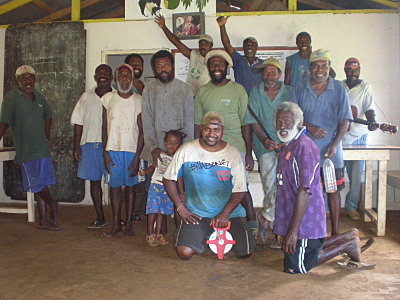
Picture of the men of Malalieu village under their village Kastom sign, a flying fox.
The secretary was proud to show us his draft constitution document which was printed, bound and issued to the head of every family, no mean feat given no computer and that printing requires a whole day’s trip to Vila. It is written in English because bislama has no dictionary and is too imprecise for a legal document. He was equally proud to tell us that he had left school at age 11 and was self taught. He asked that we send him an English land law book on our return to the UK.
Land is rarely bought and sold. As a non Ni-Van, you cannot buy land, only lease it. It appears that land is owned by the tribe/Kastom and allocated on a needs basis. On this land, you will build your house and grow your food. So most Ni-Vans will own land and a house (owned, not mortgaged) and have a constant source of free food. The village and extended family looks after the old or sick.
So, a village which seems to be moving forward and yet…… there was still this invisible race, the village women.
Vanuatu children are unlike western children. Babies and toddlers never seem to cry. Children as young as five on Nguna wander the beaches and roads alone and will chat happily to us. There is no concept here of “stranger danger”.
Some observations on people
Feet: Few people on Tanna ever wear shoes. They can run on razor sharp coral reefs. Ni Van’s have very wide, flat feet.
Facial hair: Lots of it. Beards on women are not unusual.
Smell: Especially teenagers. Deodorant is unknown and it’s very hot here. A classroom environment takes some getting used to.
Hair: For a black race there are a surprising number of ginger haired people.
Things we will miss:
People who smile and want to talk (even if it means every walk takes twice as long). Tropical fruit. Stunning coral and fish (the contents of a supermarket fish counter look like an expensive aquarium). Not having westerners’ perfume and aftershave inflicted on us.
Things we won’t miss:
Mosquitos, sleeping under a net, heat and humidity. Slipping on the spit from a kava drinker. Smokey old trucks.
So, a final round up comment on Vanuatu. Others may see it very differently but this is from our perspective:
Here we have a country of happy, well nourished people. Nearly all have their wants supplied - food, housing, land, supportive extended family etc. The only real downside we saw was the poor status of women and poor public services – roads, healthcare, telephone system etc. Yet western values and religions are being imposed on Vanuatu. Most white people in the outer islands are missionaries where the lure of western consumer goods makes the white-man’s God an easy sell. What gives a stressed westerner the right to preach that his way of life is better, especially one who has to work all hours to pay for the mortgage and excess consumer goods?
Visit Vanuatu before it becomes too Westernised. Visit the islands for the true flavour, but go with an open mind and a willingness to go with the flow.